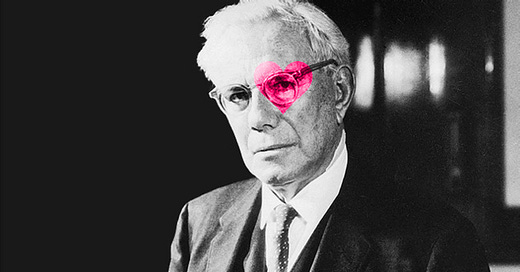So I’m reading the theologian Paul Tillich for the first time, and I keep returning to this passage in his 1954 book Love, Power and Justice:
There is another interpretation of love which is neither emotional nor ontological but ethical. In one of the determining documents of Judaism, Christianity and all Western civilization, the word love is combined with the imperative “thou shalt.” The Great Commandment demands of everyone the total love of God and the love of one’s neighbour according to the measure of man’s natural self-affirmation. If love is emotion, how can it be demanded? … [L]ove as an emotion cannot be commanded. Either love is something other than emotion or the Great Commandment is meaningless.
I recently picked up a used copy after reading an article about Tillich in The Bias, 1 an online magazine published by the Institute for Christian Socialism (yes it’s real, and yes it rules). The article described Tillich as a German socialist who was influenced by the existentialists and censored by the Nazis. I remember thinking to myself: I have found my kind of dude.
I’m a philosophy rookie who never spent a day inside a seminary, but I have read the Bible cover to cover and spent a lot of time thinking about its weird corners and mysteries. Now that I’m in my 30s with a little distance from evangelical dogma, writers like Tillich and the liberation theologians (especially Gustavo Gutiérrez, James Cone, and Dorothee Sölle) have helped me make some sense of it.
Reading Tillich has felt like hanging up Christmas lights on the eaves of my creaky socialist heart. He rejects a sentimental view of love and a cold impassive view of power, and he calls us to consider how love can flourish within and against the existing power dynamics of capital.
This brings me to the first of two announcements in today’s newsletter.
I wrote a (socialist) thing
Today I had my first article published in The Bias! The title is “Sanctuary for Trans Lives,” and I wrote it in response to Texas Gov. Greg Abbott’s Feb. 22 order targeting transgender youth and their families for persecution. You can read it here.
The article is a challenge to Christians on the left (myself included) to build durable and life-giving communities that will outlast and overcome the rising Christofascist right. I’m drawing on examples from the 1980s Sanctuary movement in the American Southwest. I’ve also used this article to highlight the work of Church Clarity, a volunteer-run database of church policies surrounding LGBTQ+ inclusion.
Getting back on the podcast horse
It’s been a while since the last episode of the Brutal South podcast because the laptop I used for recording and editing audio bit the dust. I finally got a replacement, so look for more episodes soon.
In the meantime, I appeared as a guest last week on Have You Heard, a podcast about education policy. Co-host Jennifer Berkshire, who has been tracking school privatization efforts for years now, invited me and several other locals to explain the history of “reform” proposals in Charleston County public schools. I used to be the education reporter at the daily newspaper in Charleston, so this was an interesting trip through the archives for me.
You can listen wherever you get podcasts. The episode number is 130, and the title is “Zombie Ideas in Education Reform.” Longtime Brutal South listeners will recognize a few of the other people who appear in the episode, including my friends Mika Gadsden (Episode 4: The patina of politeness) and Anjene Davis (Episode 27: “Critical race theory”).
That’s all for today. It’s Ash Wednesday. From dust you came and to dust you will return.
***
Brutal South is free. If you would like to support my work and get access to the full archives, subscriptions are $5/month.
Bookshop // Twitter // Bandcamp // Apple Podcasts // Spotify Podcasts
Here is how ICS explains the title on their website:
”The title of our magazine, The Bias, pays tribute to the efforts of a small group of British Catholics in the 1960-70s who attempted to forge a new movement of politically radical Christians, in dialogue with the emergent New Left and Marxist thought. While the group eventually chose Slant as their journal's title, Bias was first proposed.
“In the spirit of attempting to create new possibilities for radical Christianity and the church, The Bias signals our indebtedness to past Christian socialist thought, and our hope that ICS can contribute to a new sense that, in the face of capitalist destruction, Christian theology and ecclesiology must ‘slant’ to the left.”







Thank you for the Ash Wednesday meditation. I need to take this to heart.
There is much to consider in this edition. The part about Love as defined by Tillich is particularly thought-provoking.